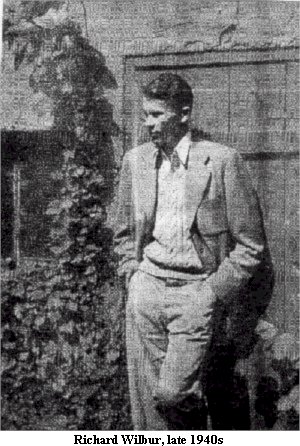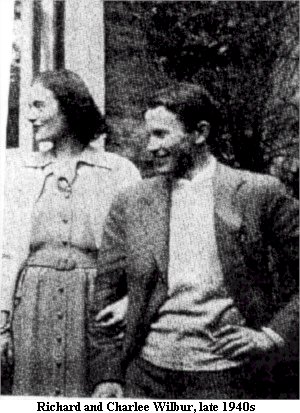
Richard Wilbur: Biography and General Commentary
 Richard Wilbur was born in New York City on March 1, 1921. He
graduated with a B.A. from Amherst, where he was editor of the college newspaper, in 1942.
Youthful engagements with leftist causes caught the attention of federal investigators
when he was in training as a U.S. Army cryptographer, and he was demoted to a front-line
infantry position where he saw action in the field in Italy, France and Germany. (When the
cryptographer in Wilbur’s unit was killed, Wilbur also took over that function.)
After demobilization, he continued his studies at Harvard where he obtained an M.A. in
1947, the year his first book was published. He was a member of the prestigious Harvard
Fellows and taught there until 1954, when he moved to Wellesley and then to Wesleyan
University. At Wesleyan he was instrumental in the founding of the acclaimed Wesleyan
University Press poetry series that, from 1959 onward, featured new work by such important
young poets as Robert Bly, James Wright, James Dickey, and Richard Howard, as well as such
already-established writers as Louis Simpson and Barbara Howes. From Wesleyan he went to
Smith as writer-in-residence. In 1987 he was named the second Poet Laureate of the U.S.,
following Robert Penn Warren.
Richard Wilbur was born in New York City on March 1, 1921. He
graduated with a B.A. from Amherst, where he was editor of the college newspaper, in 1942.
Youthful engagements with leftist causes caught the attention of federal investigators
when he was in training as a U.S. Army cryptographer, and he was demoted to a front-line
infantry position where he saw action in the field in Italy, France and Germany. (When the
cryptographer in Wilbur’s unit was killed, Wilbur also took over that function.)
After demobilization, he continued his studies at Harvard where he obtained an M.A. in
1947, the year his first book was published. He was a member of the prestigious Harvard
Fellows and taught there until 1954, when he moved to Wellesley and then to Wesleyan
University. At Wesleyan he was instrumental in the founding of the acclaimed Wesleyan
University Press poetry series that, from 1959 onward, featured new work by such important
young poets as Robert Bly, James Wright, James Dickey, and Richard Howard, as well as such
already-established writers as Louis Simpson and Barbara Howes. From Wesleyan he went to
Smith as writer-in-residence. In 1987 he was named the second Poet Laureate of the U.S.,
following Robert Penn Warren.
In the postwar years, when poets born between 1920 and 1935 often underwent dramatic
changes in their writing styles, Wilbur remained someone who mastered a style early and
continued to work within it. It is a style in a direct line of descent from Wallace
Stevens : unabashedly rich in its diction, urbane in its metrical sophistication, and
remarkably light-hearted and playful. His first and second books, The Beautiful Changes
(1947) and Ceremony (1950), were influential volumes, and Wilbur was widely
regarded in the 1950s as a poet no less important than Robert Lowell. His third
collection, Things of This World (1956), was awarded the Pulitzer Prize. Advice
to a Prophet (1961) was followed by Walking to Sleep (1969), which was  awarded
the Bollingen Prize. The Mind-Reader was published in 1976, and a New and
Collected Poems in 1987 (with twenty-four new poems).
awarded
the Bollingen Prize. The Mind-Reader was published in 1976, and a New and
Collected Poems in 1987 (with twenty-four new poems).
"The typical ghastly poem of the fifties was a Wilbur poem not written by Wilbur," wrote Donald Hall in 1961, "a poem with tired wit and obvious comparisons and nothing to keep the mind or the ear occupied." Hall added presciently: "It wasn’t Wilbur’s fault, though I expect he will be asked to suffer for it." Wilbur’s poetry has not, as Hall predicted, retained the high value it had accrued in the postwar years. Although his fame as a translator has continued to grow – his blank verse rhymed-couplet versions of several plays by Moliere have received wide praise – his poetry is often cited as an example of the formalism and the apolitical timidity that is associated with the 1950s. "Wilbur is still admired," Robert von Hallberg notes in his contribution to the Cambridge History of American Literature (1996), "but really as the best poet of the 1950s." Even though he is an outstanding example, he excels in a debased category. Among minor poets he is allowed to be most major, but among major poets he is not even considered the most minor.
A Wilbur poem reads so easily that it can dispel close scrutiny, as if the poem just as it is says all that needs to be said and withholds nothing. (As a result, Wilbur’s work has rarely attracted the attention of the skillful critic.) In fact, the smooth surface of the Wilbur poem can successfully distract us from recognizing how unusual and unexpected are the twists and leaps that structure the poem’s narrative. Many poems by Wilbur, while striking a superficial "balance," implicitly celebrate, while demonstrating, the virtues of a wit that is elaborately playful.
On Richard Wilbur (circa 1962)
Randall Jarrell
Petronius spoke of the "studied felicity" of Horace’s poetry, and I can never read one of Richard Wilbur’s books without thinking of this phrase. His impersonal, exactly accomplished, faintly sententious skill produces poems that, ordinarily, compose themselves into a little too regular a beauty – there is no eminent beauty without a certain strangeness in the proportion; and yet "A Baroque Wall-Fountain in the Villa Sciarra" is one of the most marvelously beautiful, one of the most nearly perfect poems any American has written, and poems like "A Black November Turkey" and "A Hole in the Floor" are the little differentiated, complete-in-themselves universes that true works of art. Wilbur’s lyric calling-to-life of the things of this world – the things, rather than the processes or people – specializes in both true and false happy endings, not by choice but by necessity; he obsessively sees, and shows, the bright underside of every dark thing. What he says about his childhood is true of his maturity:
In my kind world the dead were out of range
And I could not forgive the sad or strange
In beast or man.
This compulsion limits his poems; and yet it is this compulsion, and not merely his greater talent and skill, that differentiates him so favorably from the controlled, accomplished, correct poets who are common nowadays.
From Randall Jarrell, "Fifty Years of American Poetry," The Third Book of Criticism (New York: Farrar, Straus & Giroux, 1970) 331-332.
John Gery
Because of the uniform quality of Richard Wilbur's poetry over the years, changes in his vision are not as easily traceable as in the work of Rich, a poet who celebrates change. Yet despite the formal grace of his work, Wilbur is a poet of disparities as well as of unities. No more a religious poet, finally, than a sociopolitical or transcendentalist one, he joins images and ideas as much to explore what inevitably divides them as to illustrate their inherent connections, to impart "the proper relation between the tangible world and the intuitions of the spirit." To read a poem by Wilbur--whose poems like those of the Metaphysical poets are ideally suited for careful scrutiny--is to be pulled simultaneously toward anxiety and consolation, toward despair and hope, and ultimately to he deposited somewhere in between. More than most of his contemporaries, Wilbur has maintained a conviction in the continuity of the world; his deliberately balanced work seems, in its very structure, to argue a belief in nature, as well as in the role of language in nature. But his art attempts neither to convince us through a will to belief nor to cajole us through cunning; he considers his role as an artist too modest to proselytize or pander. Still, the assumptions of the believer are everywhere evident--in his rhymes, in his precise diction and playful punning, in his acceptance of prevalent literary conventions, in his patterns of imagery, in his tone.
Writing within these self -determined confines, Wilbur has been regularly criticized, ever since Randall Jarrell complained that "he never goes far enough," for having avoided the serious issues of the modern world, for being too oblique or emblematic in his approach to contemporary problems, or, in comparison to such poets as Lowell, Berryman, Plath, and Ginsberg, for not suffering enough. Rather than measure him only according to others, however, Wilbur's more appreciative readers opt to take him on his own terms, as a poet originally provoked by his disturbing experience in World War II "to take ahold of raw events and convert them, provisionally, into experience," as well as to take "refuge from events in language itself," specifically, in the language of poetry. "One must gauge the impact of the war on Wilbur," notes John Reibetanz, "not so much by looking for reflections of it in his poetry (the way we do with Lowell) as by observing the extent to which it has driven him into a world of his own making." Unlike more dramatic or politicized poets, he is a poet less of action than of observation, for whom "images come in and vision flows out," a "quiet thought-provoker ... sick of pretensiousness and extravagant claims, desiring instead a simple and direct appraisal of the ‘world's own change,’" and, most of all, "a true nature poet" who "always has had a kind of ecological prophecy to deliver" and whose "reverence for life--not as an abstraction but in its very holy and delectable particulars--makes his voice timely". . . .
Whether palatable to readers or not, the conspicuous presence of form in Wilbur's poems does more than suggest a belief in the ability of language to convey meaning. It provides two distinct advantages. First, his explicitly formal structure provides him a kind of linguistic sanctuary within which he can speculate on any subject outside his immediate experience. Like Yeats, in other words, Wilbur accepts the "artificiality" of art. In an early essay in response to the "free" verse of Williams, he writes,
In each art the difficulty of the form is a substitution for the difficulty of direct apprehension and expression of the object. The first difficulty may be more or less overcome, but the second is insuperable; thus every poem begins, or ought to, by a disorderly retreat to defensible positions. Or, rather, by a perception of the hopelessness of direct combat, and a resort to the warfare of spells, effigies, and prophecies. The relation between the artist and reality is an oblique one, and indeed there is no good art which is not consciously oblique. If you respect the reality of the world, you know that you can approach that reality only by indirect means.
The military terms Wilbur uses here ("disorderly retreat," "defensible positions," "warfare of spells"') underscore his perception of the separation of, if not the outright opposition between, art and nature.
From Ways of Nothingness: Nuclear Annihilation and Contemporary American Poetry. Gainesville, FL: University Press of Florida, 1996. Copyright © 1996 by the Board of Regents of the State of Florida.
Return to Richard Wilbur